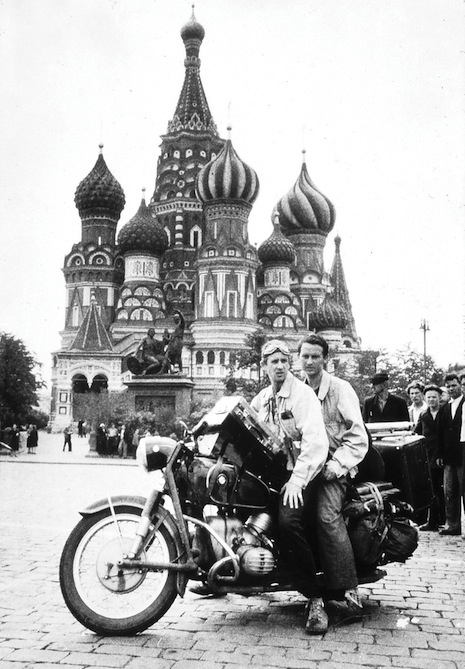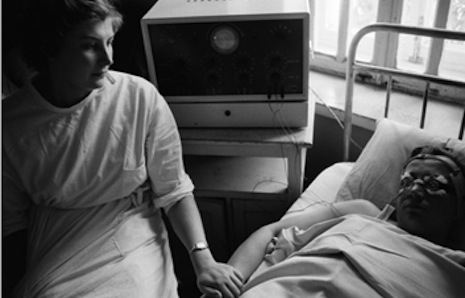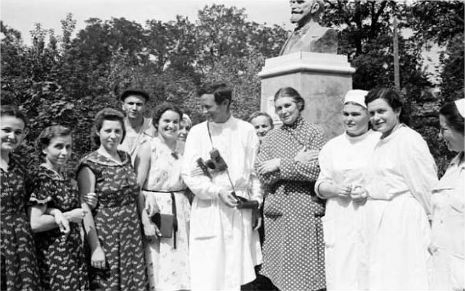
Albert and David Maysles in Russia, 1957
The work of Albert and David Maysles will rightfully appear on anyone’s list of the 20th century’s great documentarians. Grey Gardens (1976) is an absolute masterpiece, a movie of depth, subtlety, and poignancy that ranks with the all-time greats of world cinema, and Salesman (1968) and Gimme Shelter (1970) ain’t too far behind. (All three movies are available as Criterion Collection DVDs.)
So it comes as something of a surprise to learn about the fascinating path that Albert Maysles took on the way to becoming such an esteemed documentarian. Albert was trained as a psychologist and taught psychology for three years at Boston University during the 1950s. This was obviously during the chilliest portions of the Cold War—indeed, for almost the entirety of President Eisenhower’s two terms, the Doomsday Clock was set at “2 minutes to midnight,” which is the closest to “Doomsday” the clock has ever come. Maysles became interested in a project of filming mental institutions in the Soviet Union, which resulted in his first documentary, Psychiatry in Russia, in 1955. (How the hell he received clearance for such a movie is a mystery; in 1955, an American traveling to Russia was just not an easy thing to do at all.)

Psychiatry in Russia
In a decade crammed with so much ideological alarmism and hysteria, Albert’s thoroughgoing calm and reasonableness are a positive balm. He shows some skepticism of the Soviet official policy of branding Freud’s theories as “idealism” and preferring Pavlovian treatment, which emphasizes the importance of making the patient functional again (a productive member of society) over the goal of plumbing the patient’s psyche for root causes. The movie is pretty much a montage, an approach that shows a great deal while jettisoning any need for continuity or “plot”—under the circumstances, a very good choice. We see so very much in just 13 minutes!
When Jean-Luc Godard calls you “the best American cameraman,” as he did of Albert, you know you’re onto something. The Maysles brothers were among the first documentarians to use cameras small and light enough to fit on a cameraman’s shoulder, and in their work you can see the intimate view of personal experience that this allowed them to capture. At the time, they called it ‘‘direct cinema’‘; today we think of it as “cinema verité.” Such a humanistic focus would understandably disdain the importance of soulless institutions and the “official” view of the world, and indeed, this ethic would gain far more traction in the late 1960s and beyond. In that sense it’s no surprise that in Psychiatry in Russia you get hardly a whiff of the ideological conflict of the Cold War, instead highlighting the efforts of normal Russians struggling to deal with intractable problems. As Albert’s voiceover (written but not recorded by him) says, “I found myself caught up in an aura of naturalness.” The imposition of the first-person and the rejection of static, face-to-face interviews constitute much of why we value the Maysles’ work so much to this day.

Albert Maysles surrounded by (mainly female) Soviet doctors and hospital workers during the shooting of Psychiatry in Russia.
For the shoot, Albert used a “wind-up 16mm Keystone camera.” Psychiatry in Russia was commissioned by CBS but was not, in the end, televised on CBS. It was shown on The Dave Garroway Show on NBC as well as WGBH-TV public television in Boston and on network television in Canada. Two years later, he and his brother would travel to Russia and Poland, a trip that yielded Russian Close-Up and Youth in Poland (both 1957). The photograph at the top of this page comes from that trip, not the 1955 voyage that produced Psychiatry in Russia.
Here’s a very brief statement Albert Maysles gave about his motivation to film Psychiatry in Russia:
(Photo #3 and caption come from Albert Maysles by Joe McElhaney.)